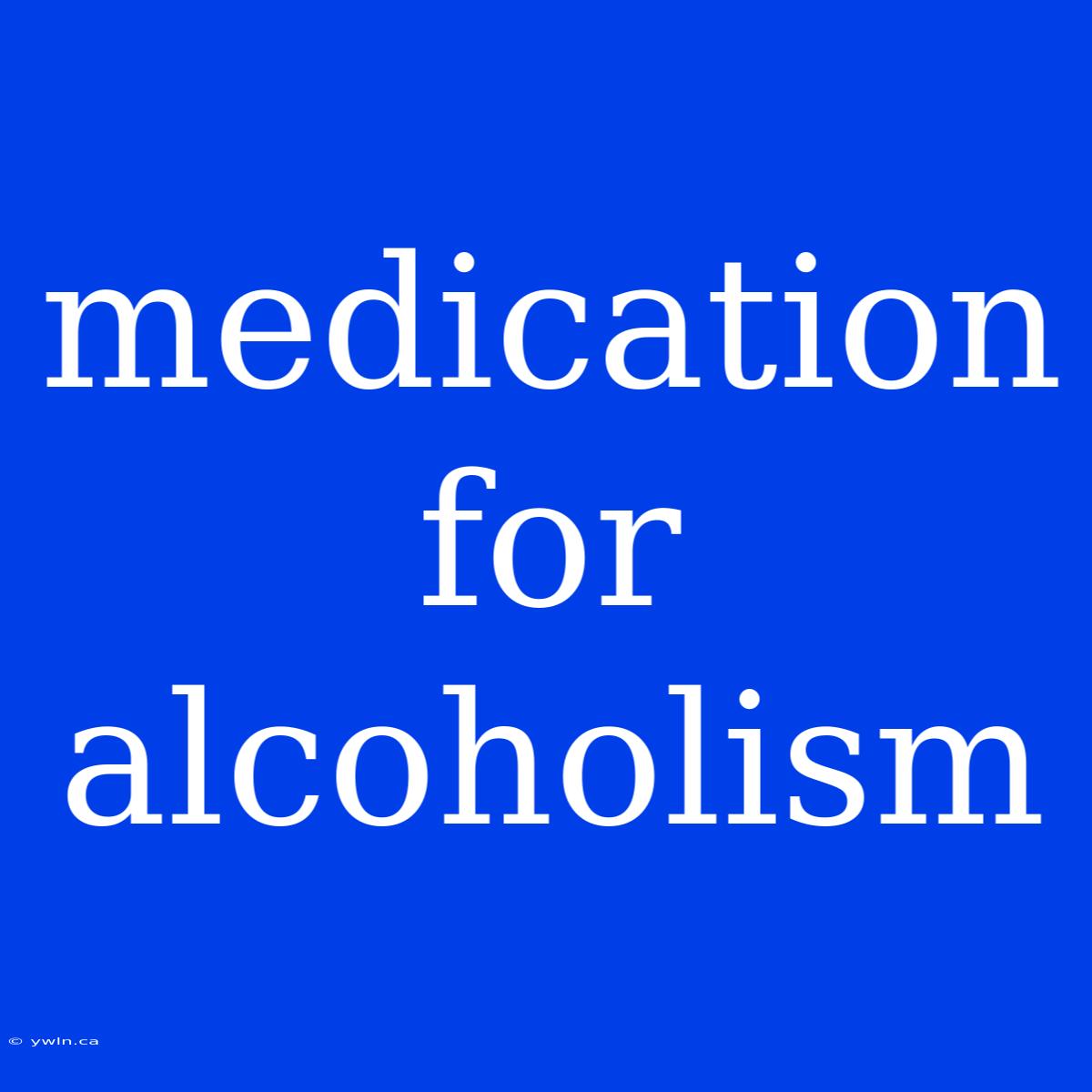Unlocking the Power of Medication in Alcoholism Recovery: A Comprehensive Guide
Question: Can medication truly help individuals overcome alcoholism? Answer: Absolutely! Medication plays a crucial role in supporting individuals on their journey to sobriety, working in tandem with therapy and lifestyle changes. Editor Note: This article delves into the world of medication for alcoholism, highlighting the benefits, types, and considerations involved. Understanding these aspects empowers individuals to make informed decisions about their treatment path and increases the chances of successful recovery.
Analysis: This guide delves deep into the realm of medication for alcoholism, drawing from scientific research, clinical experience, and expert insights. Our aim is to equip individuals and their support systems with the knowledge needed to navigate the complex world of medication and make informed choices about treatment pathways.
Key Takeaways:
| Takeaway | Description |
|---|---|
| Medication is a valuable tool | Medications can help reduce cravings, minimize withdrawal symptoms, and promote long-term sobriety. |
| Types of medications exist | Different medications target specific aspects of alcoholism, offering tailored solutions. |
| Individualized approach is crucial | The best medication depends on factors like personal history, health conditions, and treatment goals. |
| Collaboration with medical professionals is vital | Ongoing monitoring and adjustments are key to maximizing the effectiveness of medication. |
Medication for Alcoholism
Medication is a powerful tool in the fight against alcoholism, working by altering the brain's reward system and reducing the urge to drink.
Key Aspects:
- Craving Reduction: Medications help suppress the intense cravings that often trigger relapse.
- Withdrawal Management: These medications ease withdrawal symptoms like anxiety, tremors, and seizures, promoting a smoother transition to sobriety.
- Relapse Prevention: Medications can help maintain long-term abstinence by reducing the likelihood of returning to alcohol use.
Types of Medications:
1. Naltrexone: This medication blocks the pleasurable effects of alcohol, making it less appealing to drink.
2. Acamprosate: Acamprosate helps regulate the brain's neurotransmitters, reducing cravings and withdrawal symptoms.
3. Disulfiram: Disulfiram causes unpleasant side effects when alcohol is consumed, deterring individuals from drinking.
4. Gabapentin: Often used to manage withdrawal symptoms, gabapentin can also reduce cravings and anxiety.
5. Ondansetron: Ondansetron, typically used for nausea and vomiting, has shown promise in reducing alcohol cravings.
Considerations for Medication Use:
1. Individualized Treatment: No single medication works for everyone, and finding the right one requires careful consideration of individual needs and medical history.
2. Side Effects: Medications can have side effects, which may vary depending on the individual and medication used.
3. Ongoing Monitoring: Regular checkups with medical professionals are crucial to assess the effectiveness of medication and adjust treatment as needed.
4. Integration with Therapy: Medication alone is not a cure for alcoholism. It works best when combined with therapy, support groups, and lifestyle changes.
FAQ
1. Is medication safe for everyone with alcoholism?
- Medication safety depends on individual health conditions and medical history. A thorough evaluation by a medical professional is essential.
2. How long do I need to take medication?
- The duration of medication varies based on individual needs and treatment goals. It may range from months to years.
3. What if medication doesn't work for me?
- If one medication isn't effective, there are other options available. It's important to consult with a healthcare professional to explore alternative treatments.
4. Will medication make me stop drinking completely?
- Medication doesn't force abstinence. It helps reduce cravings and withdrawal symptoms, supporting individuals in their journey to sobriety.
5. Can I stop taking medication on my own?
- It's crucial to work with a medical professional when adjusting or stopping medication. Abrupt discontinuation can lead to withdrawal symptoms.
6. Does medication cure alcoholism?
- Medication does not cure alcoholism; it assists individuals in achieving and maintaining sobriety.
Tips for Medication Use
- Open communication with your doctor is vital. Discuss your concerns, expectations, and any potential side effects.
- Maintain regular checkups. Monitor your progress and adjust medication as needed.
- Follow prescribed dosage and timing. Adherence to the medication regimen is crucial.
- Integrate medication with therapy and support groups. A holistic approach maximizes recovery chances.
- Be patient and persistent. Achieving sobriety takes time and effort.
Summary
Medication plays a significant role in supporting individuals struggling with alcoholism. While not a cure, these medications empower individuals to manage cravings, navigate withdrawal, and maintain abstinence. Choosing the right medication involves careful assessment, ongoing monitoring, and a holistic approach that combines medication with therapy and lifestyle changes.
Closing Message
Understanding the power of medication in alcoholism recovery provides individuals with a valuable tool in their journey to sobriety. Seeking professional guidance and staying informed empowers individuals to make informed decisions about their treatment path, ultimately leading to a healthier and more fulfilling life.

